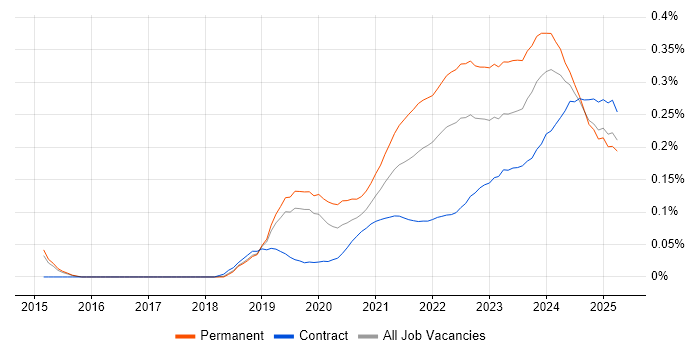Low-Code
UK > Work from Home
The table below looks at the prevalence of the term Low-Code in remote or hybrid work. Included is a benchmarking guide to the salaries offered in vacancies that cited Low-Code over the 6 months leading up to 5 March 2026, comparing them to the same period in the previous two years.
| 6 months to 5 Mar 2026 |
Same period 2025 | Same period 2024 | |
|---|---|---|---|
| Rank | 275 | 386 | 450 |
| Rank change year-on-year | +111 | +64 | +79 |
| Permanent jobs citing Low-Code | 110 | 29 | 100 |
| As % of all permanent jobs with remote/hybrid work options | 0.66% | 0.20% | 0.35% |
| As % of the Miscellaneous category | 1.89% | 0.48% | 0.95% |
| Number of salaries quoted | 92 | 20 | 78 |
| 10th Percentile | - | £46,000 | £36,250 |
| 25th Percentile | £42,500 | £47,500 | £49,063 |
| Median annual salary (50th Percentile) | £60,000 | £70,000 | £72,500 |
| Median % change year-on-year | -14.29% | -3.45% | +16.59% |
| 75th Percentile | £65,640 | £82,250 | £92,500 |
| 90th Percentile | £72,175 | £108,250 | - |
| UK median annual salary | £60,000 | £72,500 | £60,000 |
| % change year-on-year | -17.24% | +20.83% | - |
All Generic Skills
Work from Home
Low-Code falls under the General and Transferable Skills category. For comparison with the information above, the following table provides summary statistics for all permanent job vacancies with remote or hybrid options requiring generic IT skills.
| Permanent vacancies with a requirement for generic IT skills | 5,823 | 6,035 | 10,541 |
| As % of all permanent jobs with a WFH option | 34.87% | 41.58% | 37.11% |
| Number of salaries quoted | 3,621 | 3,491 | 8,570 |
| 10th Percentile | £29,000 | £37,000 | £32,788 |
| 25th Percentile | £41,250 | £47,500 | £43,750 |
| Median annual salary (50th Percentile) | £60,000 | £62,779 | £60,000 |
| Median % change year-on-year | -4.43% | +4.63% | -7.69% |
| 75th Percentile | £80,000 | £85,000 | £80,000 |
| 90th Percentile | £105,000 | £115,000 | £97,500 |
| UK median annual salary | £55,000 | £62,000 | £55,000 |
| % change year-on-year | -11.29% | +12.73% | -15.38% |
Low-Code
Job Vacancy Trend for Remote/Hybrid Jobs
Historical trend showing the proportion of permanent IT job postings citing Low-Code and offering remote or hybrid work options relative to all permanent IT jobs advertised.

Low-Code
Salary Trend for Remote/Hybrid Jobs
Salary distribution trend for jobs with remote/hybrid work options citing Low-Code.

Low-Code
Salary Histogram for Remote/Hybrid Jobs
Salary distribution for jobs with remote/hybrid work options citing Low-Code over the 6 months to 5 March 2026.
Low-Code
Co-Occurring Skills & Capabilities in Remote/Hybrid Jobs by Category
The following tables expand on the one above by listing co-occurrences grouped by category. They cover the same employment type, locality and period, with up to 20 co-occurrences shown in each category:
|
|
||||||||||||||||||||||||||||||||||||||||||||||||||||||||||||||||||||||||||||||||||||||||||||||||||||||||||||
|
|
||||||||||||||||||||||||||||||||||||||||||||||||||||||||||||||||||||||||||||||||||||||||||||||||||||||||||||
|
|
||||||||||||||||||||||||||||||||||||||||||||||||||||||||||||||||||||||||||||||||||||||||||||||||||||||||||||
|
|
||||||||||||||||||||||||||||||||||||||||||||||||||||||||||||||||||||||||||||||||||||||||||||||||||||||||||||
|
|
||||||||||||||||||||||||||||||||||||||||||||||||||||||||||||||||||||||||||||||||||||||||||||||||||||||||||||
|
|
||||||||||||||||||||||||||||||||||||||||||||||||||||||||||||||||||||||||||||||||||||||||||||||||||||||||||||
|
|
||||||||||||||||||||||||||||||||||||||||||||||||||||||||||||||||||||||||||||||||||||||||||||||||||||||||||||
|
|
||||||||||||||||||||||||||||||||||||||||||||||||||||||||||||||||||||||||||||||||||||||||||||||||||||||||||||
|
|
||||||||||||||||||||||||||||||||||||||||||||||||||||||||||||||||||||||||||||||||||||||||||||||||||||||||||||
